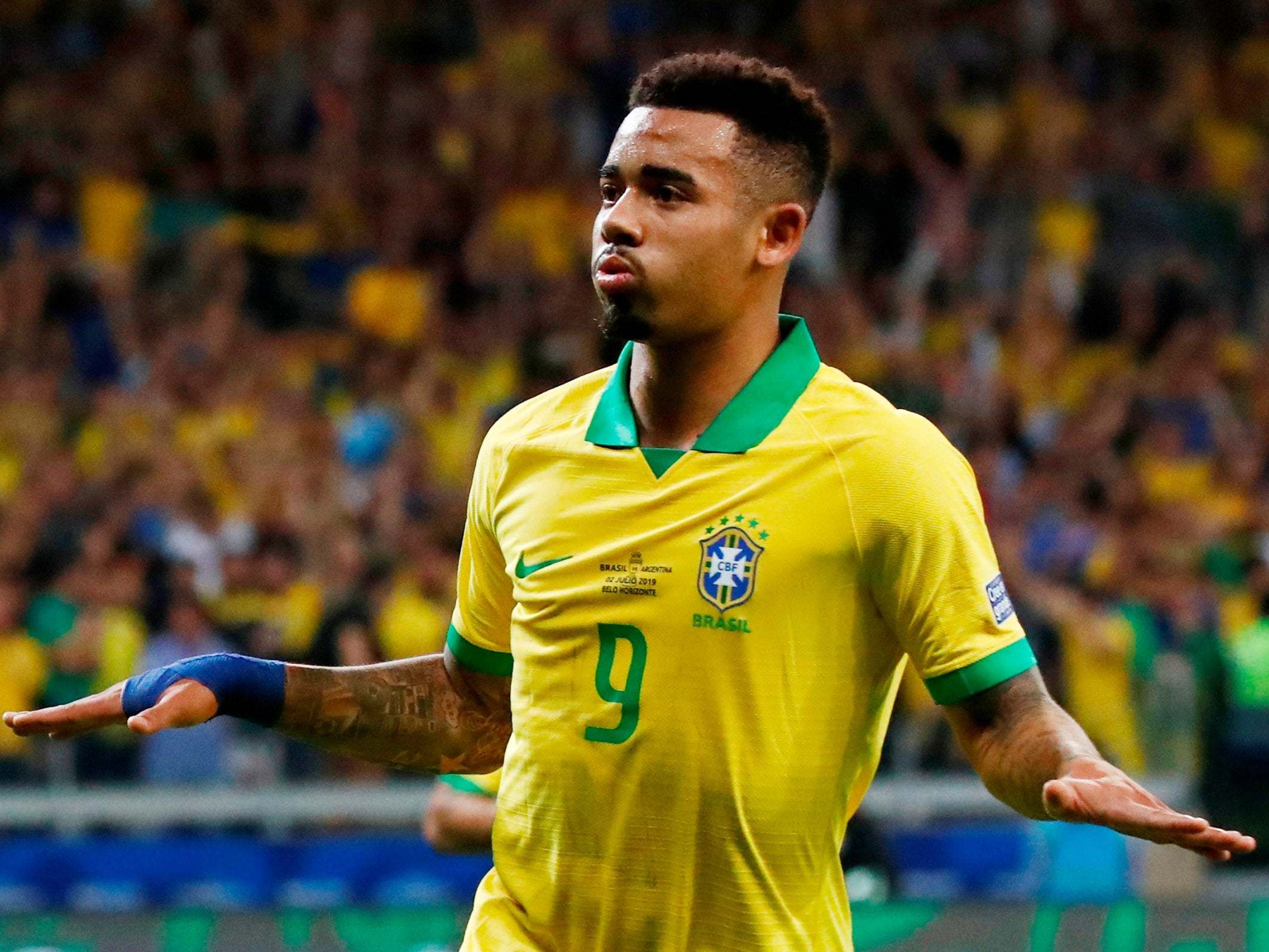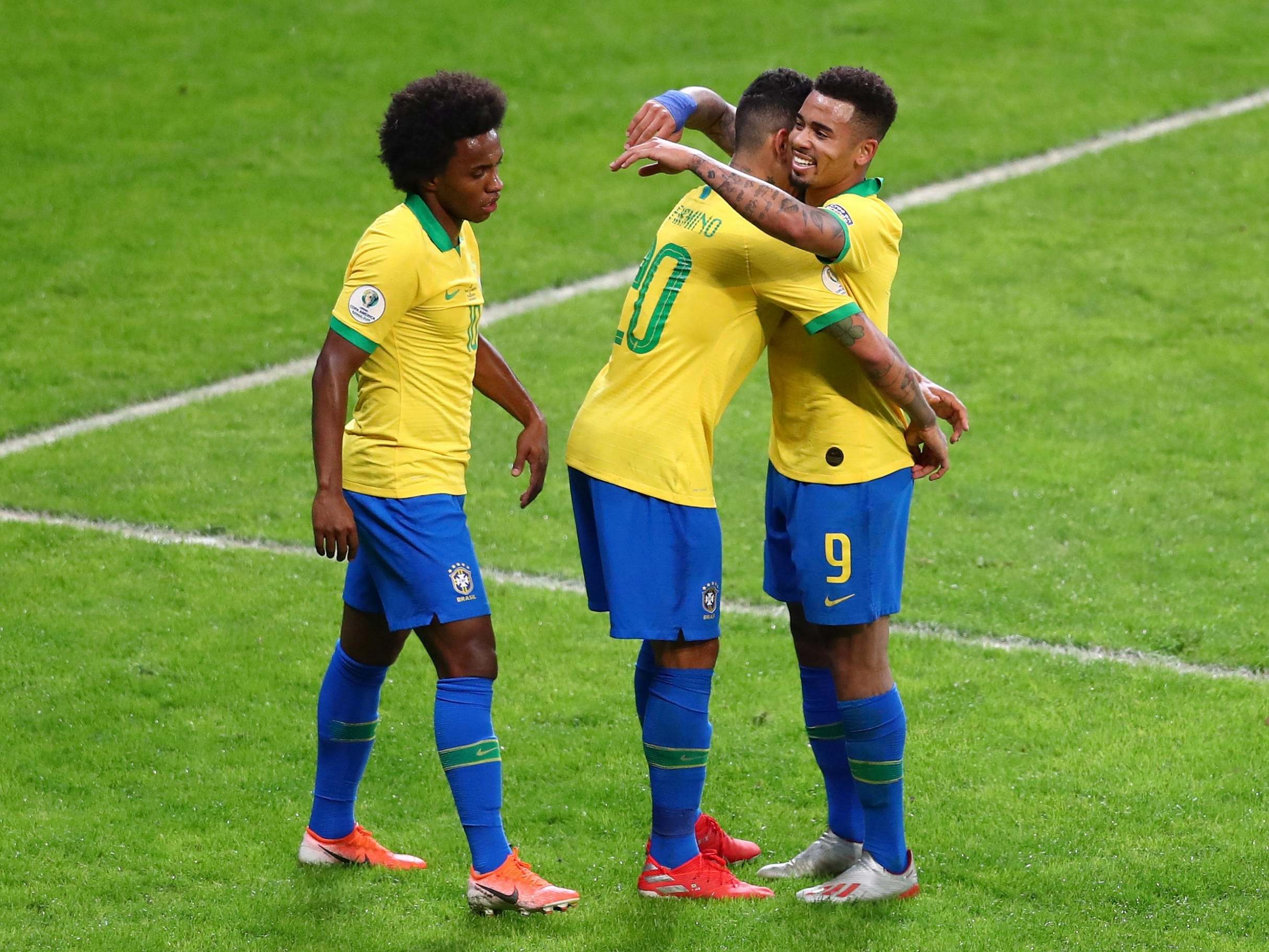Brazil vs Argentina: Gabriel Jesus ends goal drought in Copa America semi-final to prove himself as Brazil’s future
The Man City star went 676 minutes without a tournament goal for the Selecao but broke the deadlock against Argentina before setting up the second to send the hosts to the final

Your support helps us to tell the story
From reproductive rights to climate change to Big Tech, The Independent is on the ground when the story is developing. Whether it's investigating the financials of Elon Musk's pro-Trump PAC or producing our latest documentary, 'The A Word', which shines a light on the American women fighting for reproductive rights, we know how important it is to parse out the facts from the messaging.
At such a critical moment in US history, we need reporters on the ground. Your donation allows us to keep sending journalists to speak to both sides of the story.
The Independent is trusted by Americans across the entire political spectrum. And unlike many other quality news outlets, we choose not to lock Americans out of our reporting and analysis with paywalls. We believe quality journalism should be available to everyone, paid for by those who can afford it.
Your support makes all the difference.676 minutes.
A World Cup and most of a Copa América 2019. Nine games: Switzerland, Costa Rica, Serbia, Mexico, Belgium, Bolivia, Venezuela, Peru, Paraguay. And still Gabriel Jesus had not managed to score.
676 minutes of tournament football without a single goal: really not ideal for a forward. They say good things come to those who wait, but that doesn’t make the waiting any easier.
It was agonising at times. Hell, it was agonising a lot of the time, chances slipping through his fingers like sand. Take that Peru game a couple of weeks ago. When Brazil, who were 5-0 up and enjoying themselves, were awarded a late penalty, Jesus seized the ball. He looked confident, but his kick was weak and saved. The misery stopwatch ticked on.
Thiago Silva said that Jesus was “devastated” after the final whistle, and needed consoling in the changing room. “I sat down with him and told him that he could settle another game,” said Silva.
Paraguay came and went, but maybe that was for the best. Because last night, against Argentina, Jesus ended his drought with the kind of big-ticket goal that makes all the frustration pale into insignificance.
It was a tap-in, really, but it came at the end of Brazil’s best attacking move of the competition. Dani Alves sent Marcos Acúña and Leandro Paredes off for some feijão tropeiro, then found Roberto Firmino, who crossed low. Jesus did what Jesus does, wriggling into space. And this time, finally, his aim was true. As pandemonium enveloped the Mineirão, it was hard not to feel like a weight had been lifted.

It has been a difficult year for Jesus, at least when set against his rapid, frictionless ascent from teenage prospect to global superstar-in-waiting. At club level, an enviable trophy haul masked individual stagnation: he only started eight league games last season – down from 19 in 2017/18 – and rarely looked like displacing Sergio Agüero as Manchester City’s first-choice striker.
For Brazil, too, his progress slowed. Jesus himself attributes this to a World Cup hangover, with his travails in Russia denting his self-belief. “It was very difficult to come to terms with,” he said in March. “It was my toughest moment as a footballer. It bowled me over at the start of the season.”
When he was dropped from the squad for the friendlies against the USA and El Salvador two months later, there was no outcry. Critics, who thought Tite showed far too much faith in him even when his form dipped, were happy that Roberto Firmino was finally to be given a run in the team. For the first time since his debut in 2016, Jesus was on the outside looking in.
Such circumstances test a player’s reserves of grit and determination – their support system, too. Luckily for Jesus, he appears to have these bases covered. Lengthy conversations with his family – as well as Pep Guardiola – helped him process the World Cup disappointment, and he was admirably phlegmatic earlier this year when asked about his career trajectory.
“I had a very good moment, breaking through and achieving things very quickly,” he said. “Then there was a pause, but I think that’s normal. I don’t have to rush things.” There is real maturity there. Growing confidence, too, as evidenced by the light touch with which he tackles media duties: in the whole squad, perhaps only Alves looks more at ease in the anarchist scrum that is the post-match mixed zone.
It is easy to forget just how young Jesus is, how much road he has ahead of him. He only turned 22 in April, and while it’s true that he hasn’t quite kicked on to the extent that some predicted after that dynamite start to life in England, there’s also a good argument to be made that he is underrated, or at least too easily overlooked.

Take his goal tally for Brazil, which stands at 17 in 34 games. No one has scored more under Tite. Or his minutes-per-goal record at City, which is just a shade under 124. That is not to be sniffed at.
But Jesus offers so much more than goals, as he demonstrated last night. Stationed out wide – his position when he first broke into the Palmeiras team – he was a constant thorn in Argentina’s side. He dribbled with menace, winning countless free-kicks; he tracked back like his life depended on it.
With 65 minutes played, he looked ready to come off, having run himself into the ground. But a few moments and a few deep breaths later, he was off again, barrelling forward on the break to set up Brazil’s second goal. He got a lucky break when the ball bounced back off Germán Pezzella, but the skill thereafter was sublime; Nicolás Otamendi and Juan Foyth were left in a heap on the floor, and Firmino polished off his unselfish pass across goal.

Is there still room for improvement for Jesus? Of course, and he admits as such. He says he needs to shoot more; he should probably also beat his marker with greater frequency, given his pace and trickery. But the standing ovation he received at the Mineirão suggested he is doing something right – and reflected the fact that he, more than anyone, swung this superclássico Brazil’s way.
Argentina pushed for a response in the final stages, Lionel Messi doing his usual walking deity act.
But Brazil didn’t need God. They had Jesus. And Jesus, at long, long last, had his goal.
Join our commenting forum
Join thought-provoking conversations, follow other Independent readers and see their replies
Comments